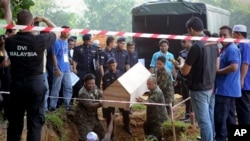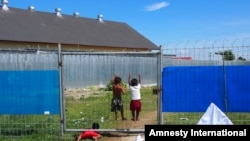Survivors of the Rohingya exodus from Myanmar to Indonesia this year have described abuses at sea and on land at the hands of their smugglers. In a report released Wednesday by a human rights organization, they said people who were unable to pay were shot or thrown overboard.
The testimonies, which Amnesty International said were the most comprehensive to date, suggested that “hundreds, maybe thousands, more refugees and migrants have perished at sea than first estimated” — far more than the U.N. estimate of 370 deaths.
“Abuses that were perpetrated against them by the boat crews were just unimaginable,” said Anna Shea, a researcher for refugee and migrant rights at Amnesty International in London.
Shea told VOA she spoke with young children who were “beaten many times a day, being thrown into the sea for hours on end. Some [of the other children] drowned, some of them survived. Just a horrific scale and severity of abuses.”
Virtually every Rohingya reported being beaten by boat crews or witnessing the beatings of other passengers, according to the Amnesty International report.
Beaten for crying
“People were beaten for moving, for begging for food or water, and for asking to use the toilet. Children were beaten for crying,” said the report, whose publication came as another sailing season began in the Bay of Bengal and Andaman Sea.
There is no confirmation yet of a significant fresh exodus after the end of the monsoon season, but sources told VOA that two small vessels, carrying a few hundred people, had apparently made successful journeys to Malaysia recently from Chittagong in Bangladesh and South Maungdaw in Myanmar's Arakan state.
Increased international scrutiny and a crackdown, especially by Thailand's military government, have — at least temporarily — may have made it more difficult to utilize traditional smuggling passages.
Observers, however, said they expected more boats to make the perilous journey in the weeks ahead, but perhaps not in the numbers seen earlier this year, when an estimated 13,000 people took to the sea to escape repression in Myanmar. Some of those making the journey are also economic migrants from Bangladesh.
Action by Thailand
Thailand this year moved against the smuggling networks after more than two dozen bodies were discovered in jungle graves near sites of suspected people-smuggling camps along the Thai-Malaysian border. The closure of the transit camps led smugglers to abandon at sea vessels crammed with thousands of malnourished migrants, rather than risk coming ashore.
"There were great depredations, beatings, starvation and murders by ruthless brokers who treated people like commodities," Jeffrey Labovitz, the chief of mission in Thailand for the U.N.'s International Organization for Migration, told VOA.
Many of the Rohingya who reached Indonesia were emaciated and ill and had difficulty walking after having been crammed on the ships for so long.
Amnesty International said its report was based on interviews in August with 179 asylum-seekers, mainly in Aceh, Indonesia, as well as local residents, members of civil society organizations, and officials of governments and international agencies.
Amnesty International said it considered that many if not most of the Rohingya who reached Aceh in May 2015 were “on their way to being trafficked,” according to Shea.
“Many of them paid very, very low fees and some paid nothing at all to get on their boats, which suggests that the boat crews were going to make money in other ways,” she told VOA. “There is a large trafficking network of forced labor in the region. ... People are in effect enslaved, often within the context of the Thai fishing industry.”
Summit on crisis
Seventeen countries attended a summit on the resulting humanitarian crisis in Bangkok in late May. There was no regional agreement, although Indonesia and Malaysia said they would continue to provide temporary assistance and shelter thousands of the irregular migrants if they were resettled or repatriated within one year.
There are reports Bangladesh is finalizing an agreement that would permit hundreds of thousands of workers to legally find jobs in Malaysia. Such a system would reduce the need for the clandestine and dangerous smuggling networks.
The Rohingya, whom the government of Myanmar does not recognize as a distinct group, have repeatedly been the victims of intimidation and violence in that country. Since 2012, tens of thousands have been living in overcrowded camps, conditions that have led many to flee Myanmar for places such as Malaysia, despite the risks.















